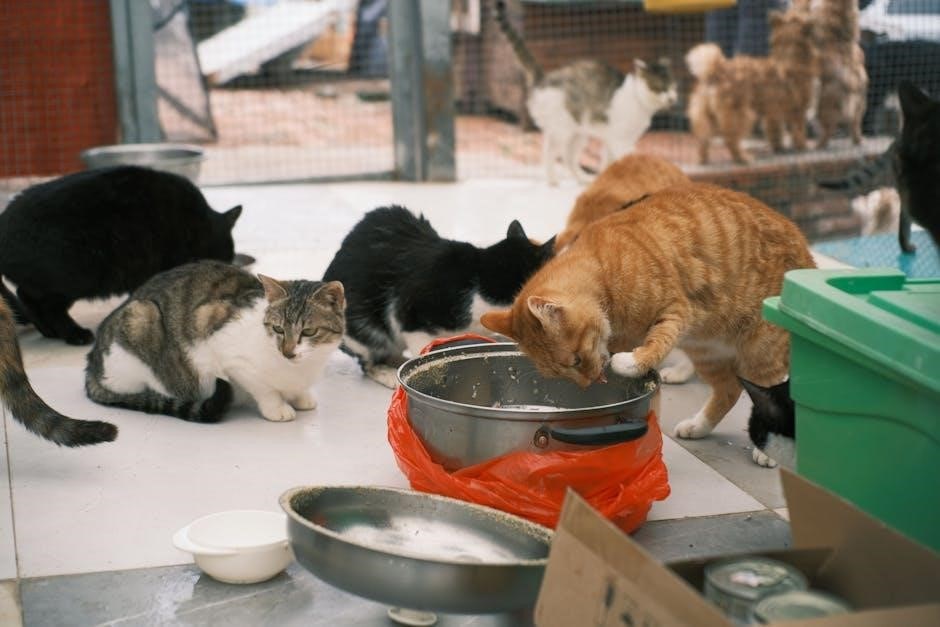The Feed the Cats Program is a comprehensive guide focused on proper cat nutrition‚ emphasizing high protein intake and avoiding poor diets to prevent common feline diseases.

Overview of the Program
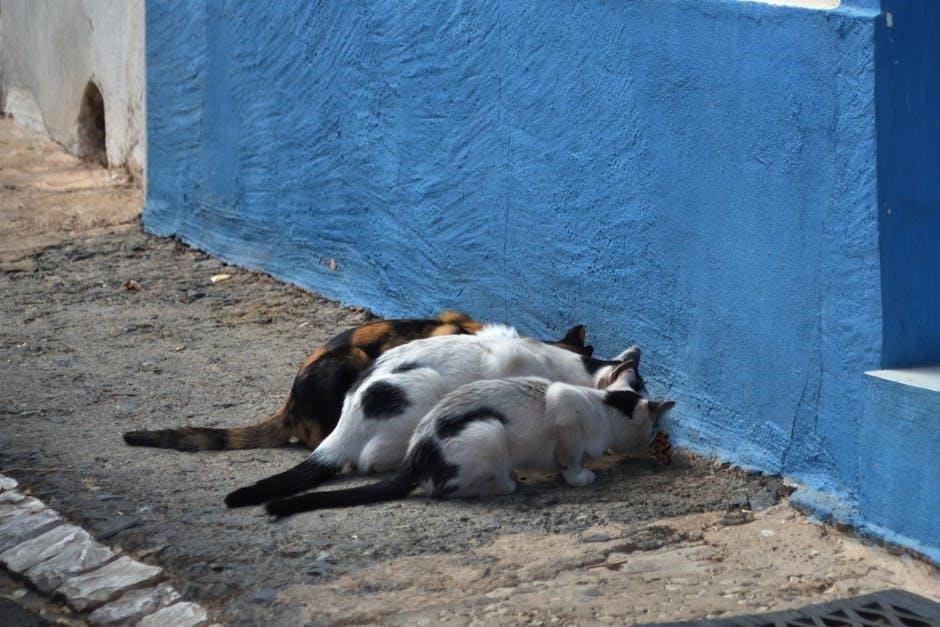
The Feed the Cats Program is a comprehensive guide designed to help cat owners provide optimal nutrition. It includes detailed feeding charts‚ tips for reading food labels‚ and expert advice on maintaining feline health. The program emphasizes proper portion sizes‚ avoiding overfeeding‚ and selecting high-quality cat food. It also features testimonials from veterinarians and cat owners‚ offering practical insights into improving your cat’s well-being through informed dietary choices and consistent feeding habits.
Importance of Proper Cat Nutrition
Proper cat nutrition is vital for maintaining optimal health‚ as cats are obligate carnivores requiring high protein and fat with minimal carbohydrates. A balanced diet prevents common diseases like obesity and diabetes‚ ensuring longevity and vitality. The Feed the Cats Program emphasizes the link between diet and health‚ providing guidance to avoid nutritional deficiencies and promote overall well-being through informed feeding practices tailored to feline needs.
Understanding Cat Food Labels
Understanding cat food labels is crucial for ensuring your cat receives proper nutrition. Look for high-quality protein sources like chicken or salmon‚ and avoid excessive carbohydrates. Always check for AAFCO certification‚ ensuring the food meets nutritional standards for cats‚ and consult your veterinarian to make informed decisions tailored to your cat’s needs and health conditions.
Key Nutritional Requirements for Cats
Cats are obligate carnivores‚ requiring a diet rich in animal-derived protein and fat. Essential nutrients include taurine‚ vitamin A‚ and arachidonic acid‚ which are vital for heart health‚ vision‚ and skin integrity. Cats also need adequate moisture in their diet to maintain urinary health. Avoid carbohydrates‚ as they are not biologically necessary for feline nutrition. High-quality protein sources‚ such as chicken or salmon‚ should be the primary ingredients in cat food to ensure optimal health and prevent nutritional deficiencies.
Interpreting Ingredients and Nutritional Content
When analyzing cat food labels‚ prioritize ingredients like chicken‚ salmon‚ or turkey‚ ensuring they are listed as the first few items. Avoid fillers such as corn or rice‚ which provide minimal nutritional value. Look for guaranteed analysis to confirm protein and fat levels‚ and check for added supplements like taurine and vitamin A‚ essential for feline health. Avoid foods with artificial preservatives or excessive carbohydrates‚ as they can harm your cat’s well-being.
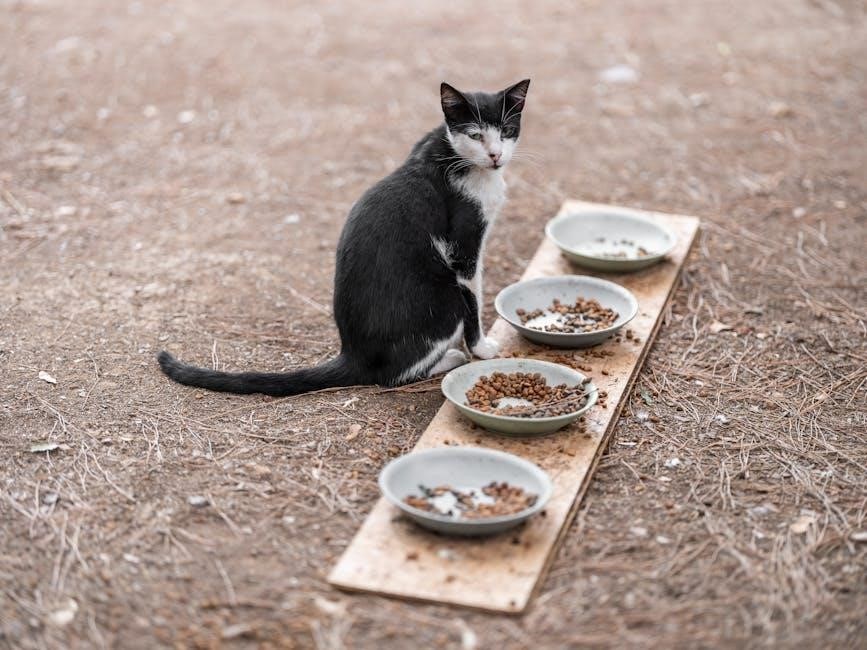
Feeding Guide for Cats
A well-structured feeding plan ensures cats receive balanced nutrition‚ focusing on high protein and fat‚ with minimal carbohydrates‚ tailored to their life stages and specific dietary needs.
Recommended Daily Feeding Amounts
Cats require a diet rich in protein and fat‚ with minimal carbohydrates. The ideal feeding amount varies based on weight‚ age‚ and activity level. Generally‚ indoor cats need 200-300 kcal/day‚ while active or outdoor cats may require more. Portion sizes should be divided into 2-3 meals to mimic natural hunting habits. Adjustments should be made under veterinary guidance to ensure optimal health and prevent overfeeding or underfeeding.
How to Determine the Right Portion Sizes
Use the feeding chart on the cat food label as a starting point‚ then adjust based on your cat’s weight‚ age‚ and activity level. Monitor their weight and body condition regularly‚ and modify portions accordingly. High-protein‚ low-carbohydrate foods are ideal for cats. Consult a veterinarian for personalized advice to ensure your cat is receiving the correct amount of nutrients. Track progress to maintain a healthy weight and overall well-being.

Benefits of the Feed the Cats Program
Improves feline health‚ prevents diseases‚ and enhances well-being by ensuring proper nutrition‚ reducing obesity‚ and boosting energy levels through balanced‚ high-protein diets tailored for cats.
Improved Health and Well-being of Cats
The Feed the Cats Program promotes optimal feline health by ensuring cats receive balanced‚ high-protein diets. Proper nutrition prevents obesity‚ boosts energy levels‚ and reduces the risk of chronic diseases. Cats thrive on diets rich in essential nutrients‚ leading to healthier coats‚ stronger immune systems‚ and improved overall well-being. This program emphasizes the importance of avoiding poor-quality foods that can lead to common health issues in cats‚ ensuring they live longer‚ happier lives.

Case Studies and Testimonials
Real-life examples highlight the positive impact of the Feed the Cats Program. Many cat owners report noticeable improvements in their pets’ health‚ such as shinier coats and increased energy levels. One testimonial shares how switching to a high-protein diet reduced a cat’s obesity and improved its overall well-being. Veterinarians endorse the program‚ citing its alignment with feline nutritional needs. Testimonials prove the program’s effectiveness in transforming cats’ lives through proper feeding practices.
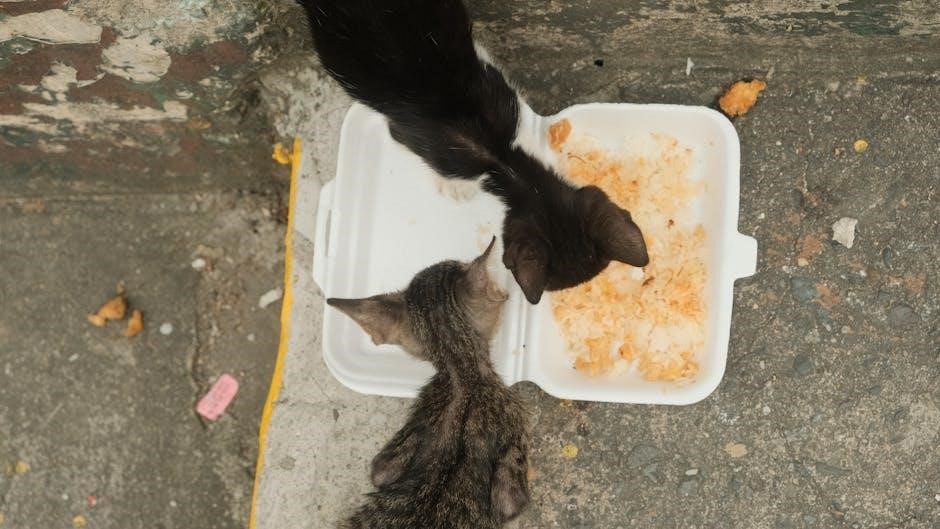
Maintaining a Healthy Weight in Cats
Proper nutrition and portion control are key to preventing obesity. High-protein diets and regular exercise help cats maintain a healthy weight‚ ensuring overall well-being and longevity.
The Role of Diet in Weight Management
A balanced diet is crucial for maintaining a healthy weight in cats. High-protein‚ low-carbohydrate foods mimic their natural diet‚ reducing the risk of obesity. Avoid fillers and excessive fats‚ as they contribute to weight gain. Portion control and regular feeding schedules help prevent overeating. Monitoring calorie intake ensures cats stay lean‚ preventing related health issues like diabetes and joint problems. A veterinarian can tailor dietary plans for individual needs‚ promoting long-term health and well-being.
Monitoring and Adjusting Feeding Habits
Regularly monitoring your cat’s weight‚ activity levels‚ and overall health is essential to ensure optimal feeding habits. Track portion sizes and adjust based on individual needs. Signs of overfeeding include weight gain‚ while underfeeding may lead to lethargy. Adjust the frequency and amount of meals to maintain a healthy balance. Consulting a veterinarian can help refine feeding strategies for specific life stages or health conditions‚ ensuring your cat thrives.
Choosing the Right Cat Food
Cats are obligate carnivores‚ requiring high protein and fat with minimal carbohydrates. Consulting a veterinarian helps determine the best diet for life stages and conditions; Proper nutrition prevents diseases.
Different Types of Cat Food: Wet vs. Dry
Wet cat food offers higher moisture content‚ mimicking a cat’s natural diet‚ while dry food is convenient and helps maintain dental health. Wet food often contains more protein and fewer carbs‚ supporting cats’ carnivorous needs. Dry food can be cost-effective and reduces feeding frequency. Choosing between them depends on the cat’s preferences‚ health conditions‚ and lifestyle‚ ensuring optimal nutrition for well-being.
Considering Life Stages and Special Diets
Cats require tailored nutrition based on their life stages—kitten‚ adult‚ or senior—and special dietary needs. Kittens need high protein for growth‚ while seniors may require joint support. Special diets address conditions like allergies‚ obesity‚ or diabetes. Wet or dry food choices should align with these needs‚ ensuring optimal health. Consulting a veterinarian helps determine the best diet for individual cats‚ promoting longevity and well-being.
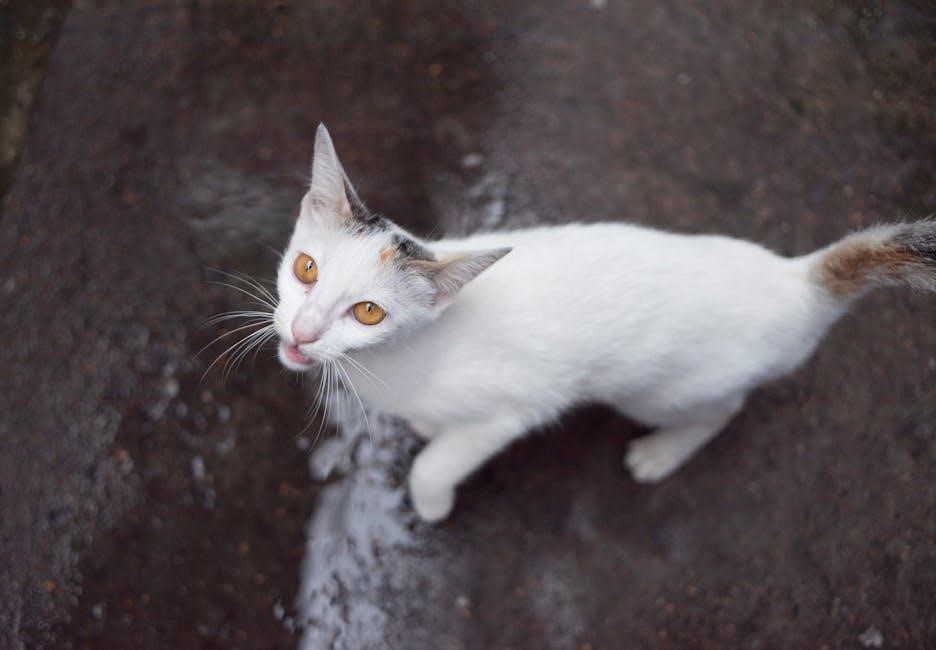
Common Mistakes in Feeding Cats
Overfeeding‚ underfeeding‚ and inappropriate food sources are common errors. Ensuring proper portion sizes and avoiding human food helps maintain feline health and prevents diet-related issues effectively.
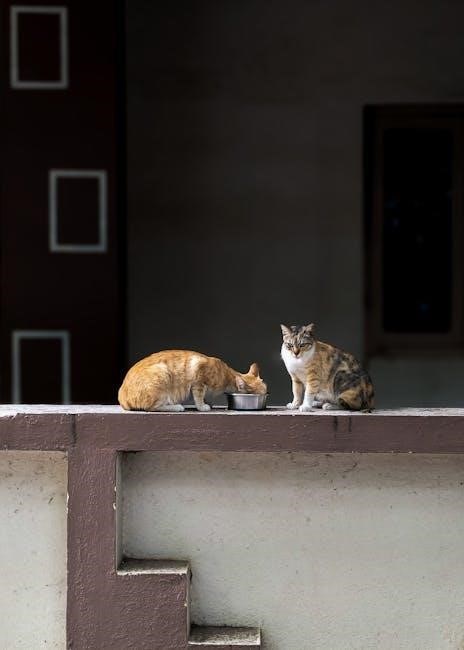
Overfeeding and Underfeeding: Consequences
Overfeeding can lead to obesity‚ diabetes‚ and joint issues in cats. Conversely‚ underfeeding may cause malnutrition‚ weakened immunity‚ and poor coat health. Both extremes can significantly shorten a cat’s lifespan and reduce quality of life. Maintaining a balanced diet is crucial to prevent these issues. Proper portion control and regular vet check-ups are essential to ensure optimal feline health and well-being.
Avoiding Inappropriate Food Sources
Feeding cats inappropriate food sources‚ such as human snacks or low-quality ingredients‚ can lead to nutritional imbalances and health issues. Cats require a diet rich in protein and fat‚ with minimal carbohydrates. Ensuring that their food meets these requirements is vital for maintaining their health and preventing diseases. Always choose high-quality‚ nutrient-rich cat food to provide the best possible nutrition for your feline companions.

The Future of Cat Feeding and Nutrition
The future of cat feeding focuses on emerging trends in the cat food industry‚ such as personalized diets and advanced nutritional research‚ ensuring better health outcomes for cats.
Emerging Trends in Cat Food Industry
The cat food industry is evolving with personalized nutrition‚ sustainable packaging‚ and grain-free options gaining popularity. Advanced manufacturing technologies and a focus on human-grade ingredients are becoming standard. Consumers increasingly prioritize eco-friendly brands and transparent labeling. Digital platforms now offer tailored feeding plans‚ while veterinary-backed formulations address specific health needs. These trends reflect a growing awareness of cats’ dietary requirements‚ driving innovation to meet pet owners’ demands for quality and sustainability.
Advancements in Nutritional Research
Recent advancements in nutritional research highlight improved understanding of feline dietary needs‚ focusing on high-quality protein sources and minimal carbohydrates. Studies emphasize the importance of essential vitamins and minerals for optimal health. Personalized nutrition plans‚ tailored to life stages and health conditions‚ are gaining traction. These findings underscore the critical role of diet in preventing chronic diseases‚ such as obesity and diabetes‚ in cats‚ promoting longer‚ healthier lives for felines worldwide.
The Feed the Cats Program emphasizes proper nutrition for feline health‚ focusing on high protein and low carbohydrates to prevent diseases and promote overall well-being in cats.
Summarizing the Feed the Cats Program
The Feed the Cats Program is a comprehensive guide to feline nutrition‚ emphasizing the importance of high protein and low carbohydrate diets to meet cats’ specific needs. It highlights the link between poor diet and common diseases‚ offering practical advice on reading food labels and selecting appropriate meals. By focusing on proper feeding habits‚ the program aims to improve the overall health and well-being of cats‚ ensuring they thrive with balanced nutrition;
Encouragement to Implement the Program
Embracing the Feed the Cats Program ensures your feline friends receive optimal nutrition‚ tailored to their natural needs. By following the program’s guidelines‚ you help prevent diet-related illnesses and promote overall well-being. Witness improvements in energy‚ coat health‚ and immunity. Taking small steps today can lead to a healthier‚ happier cat tomorrow. Start implementing the program now and give your cats the care they deserve.
